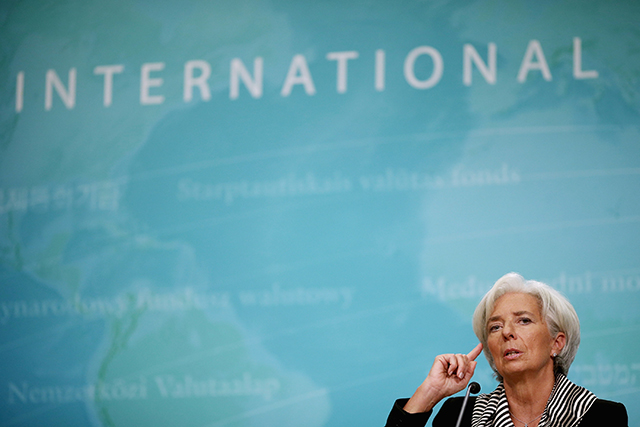How Conservatives Win
Mike Needham /

International Monetary Fund Managing Director Christine Lagarde. Photo: Chip Somodevilla/Getty Images
It should come as no surprise The New York Times would bury news of a conservative victory over President Obama on page 8. The lead paragraph said it all:
Senate Democrats, bowing to united House Republican opposition, dropped reforms of International Monetary Fund governance from a Ukraine aid package on Tuesday.
The real question is whether this was merely a moment in time or a seminal shift in how congressional Republicans will approach future showdowns. And to be clear, future showdowns are inevitable if we are to achieve any conservative policy victories.
Before going further, it is important to explain the battlefield on which the fight was won.
On Monday night, 26 Senate Republicans and their Democrat colleagues joined arms to ensure a bill including an aid package for Ukraine cleared a key procedural hurdle. From a conservative policy perspective there was just one problem: the package also contained extremely controversial reforms to the IMF.
The controversy began at President Obama’s insistence. Dutifully following orders, Harry Reid (D–Nev.) refused to bring up the clean House-passed Ukraine aid package, opting instead to send the bill to committee where the IMF “reforms” were added. As The Heritage Foundation’s Jim Roberts explained, the reforms would “increase Russia’s power at the IMF at the very time when the U.S. is seeking to punish Russia for its act of war and aggression in Crimea.”
Nonetheless, many Republicans urged their colleagues to pass the Ukraine package despite the inclusion of this poison pill, warning that the party could not be seen as standing in the way of a bill addressing such a pressing foreign policy need. “Don’t call yourself Reagan Republicans,” John McCain scolded opponents of the package. “Ronald Reagan never, would never let this kind of aggression go unresponded to by the American people.”
The critique, which Reid himself echoed, was nothing short of absurd. Conservatives in the House and Senate recognized that Democrats were the ones responsible for holding up the aid to Ukraine by insisting on the inclusion of the controversial and unrelated IMF provision. As that narrative began to take hold and House conservatives made their opposition known, Reid relented.
Harry Reid is not accustomed to folding.
At the outset of the 113th Congress, Reid threatened to move forward with the “nuclear option”—eliminating the 60-vote threshold for most nominees—if Senate Republicans did not accept a deal to streamline the “legislative process.” To appease Reid and avert the nuclear option, Senate Republicans swallowed the streamlining, which ultimately weakened the rights of the Senate minority and limited the opportunities for individual senators to represent their constituents. In May, a mere four months later, Reid once again threatened to invoke the nuclear option. By July, Senate Republicans capitulated yet again, giving Democrats a victory on seven controversial nominees.
We all know how the story ends. In November, Senate Democrats finally used the nuclear option by unilaterally eliminating the 60-vote threshold for cloture—a standard for nearly four decades—for all nominees except those to the Supreme Court. It was exactly what Senate Republicans had feared at the beginning of the year. Reid used that fear to extract concession after concession, until he finally closed the deal on what he wanted all along.
Reid’s efforts to extort the Senate minority using similar tactics have not prevented Republicans from achieving some victories in the 113th Congress. In the Senate, conservatives rallied the grassroots and blocked President Obama’s gun control agenda, while amnesty and the Internet sales tax remain stalled (for now) in the House.
The Ukraine-IMF outcome offers a guide as to how conservatives can continue winning such fights in the future. Conservatives could have easily thrown their hands up when more than half the Senate Republican conference resigned themselves to defeat. Not only did they withstand the rhetorical attacks from Reid and Obama, but they managed to turn the tables.
Although it was an important moment for conservatives (and America’s foreign policy), there is no time to rest. Today the Senate took a key procedural step toward extending emergency unemployment benefits first put in place in 2008. If conservatives can apply the lessons of this week to that debate by demonstrating similar resolve to stand by principle, good policy should follow.
